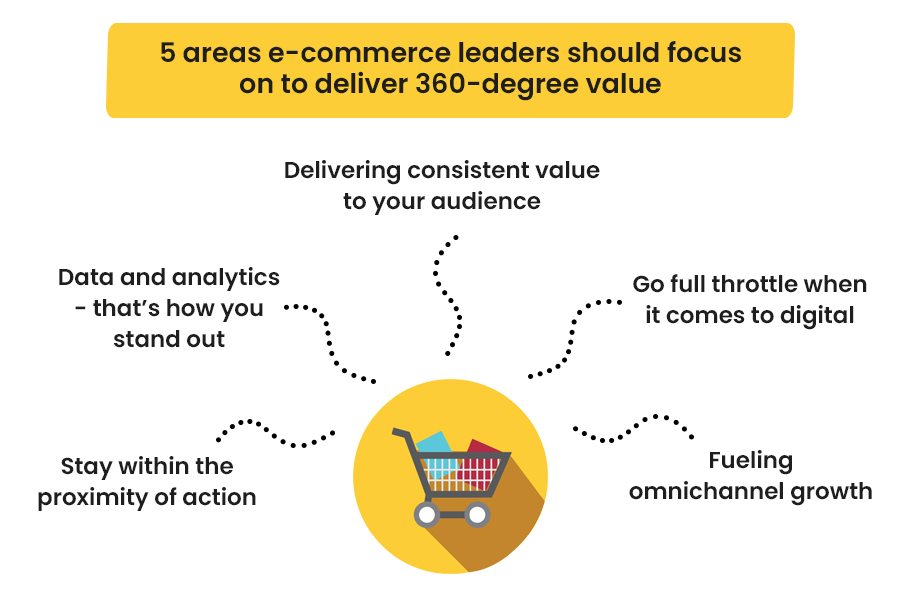Ecommerce is quickly rising to be the most favourite shopping platform among the consumers, and leaders of the retail industry recognize the omnipresence of this channel. As a result, brands are looking forward to being a part of the ecommerce revolution, and some are even setting up a whole new vertical for their ecommerce operations. Even though every business on the planet is making this shift, only a handful of ecommerce platforms are controlling the majority of the market share. To be successful in the ecommerce race can change the odds for your business, and the current technology scenario in the market is presenting the opportunities for the small players to compete with the giants of the industry.
More often than not, brands seem to think that optimizing their current business model to suit the ecommerce wave is how they can make a dent in this space. While this may give temporary results, it’s definitely not a solid strategy to dominate this space. To truly dominate in the ecommerce era, a business has to reimagine its operations, aligning itself to meet the omnichannel standards in the market. This shift in approach can be a huge step for businesses. Currently, most of the brands view ecommerce operations as an extension of their multichannel strategy. It differs from the omnichannel experience as omnichannel retail strategy weaves a web among the other channels, helping the brand to deliver a holistic experience to their users consistently.
And for emerging brands, devising successful ecommerce strategies is a must to survive in a market where the options for consumers are abundant. As one of the top ecommerce app development services providers, we have compiled the list of areas that ecommerce platforms should prioritize. Check out these following strategies for brands to elevate their ecommerce game.
Areas ecommerce business leaders should focus on to deliver 360-degree value

-
Stay within the proximity of action
The role of digital in connecting consumers and brands is enormous. With new platforms emerging across the globe, brands have increased chances of connecting to their consumers, not in just a single platform but across multiple digital platforms. For example, social media channels like Instagram and Tik Tok are a great place for a consumer goods ecommerce business to interact with their consumers or create a point of interest that hooks their audience. Audiences are consuming content at an enormous rate, and for brands to truly amplify their ecommerce strategy, they should create multiple points within the platform that could spark an interaction between consumers and their brand. People are consuming content at an astonishing rate, and brands can monitor this flow of content to even identify their inclinations or needs. Staying on top of these new trends in ecommerce is a sure shot way for brands to expand their online traffic, and eventually the sales.
-
Data and analytics- that’s how you stand out
Data is a crucial part of the puzzle as brands can change the narrative of their ecommerce operations effectively. However, leveraging data to drive sales is as much of an art as it is science. In the present market, consumers are aware of their data and their relationship with brands. While consumers are ready to exchange data for better services, brand loyalty and credibility plays a huge role in this transaction. For startups and new brands, it is impossible to compete with the industry giants as they have a stronger brand presence and consumer relationships, relatively. To counter this, brands need to come up with creative ways to build credibility among their audience. Content creation is one of the most commonly used channels by brands to engage with their consumers, ultimately building confidence among them. However, getting data is just the first step of the long process. Analytics is how brands extract insights from these data. Brands with successful data strategies have a robust approach to data leveraging, and the whole process is engineered in such a way that it brings context to the whole data equation.
Cybersecurity is another area that brands tend to focus when devising an omnichannel ecommerce strategy. As businesses collects huge amounts of data, they are prone to cyberattacks or data breaches, and such events could severely damage the trust between the consumers and brands. To know more about the data equation and how brands can stay ahead of the curve, check out this article.
-
Delivering consistent value to your audience
Critical teams for a business in this digital age like marketing, sales, creative, data and analytics, product engineering, etc., need to be in sync to deliver consistent value to your audience. This not just helps your brand reach out to a wider consumer base, but also builds resilience to withstand the dynamic marketplace. Ecommerce app development solutions are popular in the market, as they allow them to scale much easier. Also, apps have come a long way since the start of the digital revolution. Currently, they power a lot of businesses to connect with their consumers and facilitate international business transactions effortlessly.
Enterprise level applications are helping retailers to automate their planogram automation, as planogram analysis is crucial for a retail business. Also, it helps them set a unique brand tone and deliver cutting-edge customer experience, an important factor in driving sales.
-
Go full throttle when it comes to digital
A foundation of digital capabilities are necessary for ecommerce platforms to scale, but an enhanced approach to digital literacy brings longevity to your ecommerce operations. While most of the brands are hiring in-house, collaborating with a technology service provider or an IT firm could also be an easy way to hack growth. Contrary to popular belief, a better approach to digital not just streamlines your business operations but also helps you identify opportunities and act on it instantly. And organizations that truly capture the spirit of digital tend to heavily focus on hiring the right talent to make the strategy work for them. The digital disruption is changing the way C-suite leaders and senior executives view business, and brands need to focus on embedding digital at every stage of their pyramid. This allows your ecommerce platform to carry the momentum across the marketplace. As mentioned earlier, leveraging data brings huge returns for your ecommerce operations if done right, but if organizations miss the context of the data, then it doesn’t provide any real value. Being truly digital delivers on this ability, the ability for ecommerce brands to understand the context of the data in hand.
-
Fueling omnichannel growth
E-commerce fits into the retail’s post-pandemic future, and this is one of the pressing reasons for brands to have a solid e-commerce strategy. Business leaders in the ecommerce space often confuse omnichannel and multichannel approaches. When a business adopts an omnichannel strategy, it brings a string of coordination across its channels, providing a seamless experience to its consumers. In a multichannel approach, the channels are islanded, and there is not any coordination among the channels. The first question ecommerce business leaders need to understand while adopting the omnichannel strategy is to understand their customer needs and their behaviour across channels in depth. To understand this, they need to create multiple touch points to observe and collect data. Adopting an omnichannel strategy is just the beginning of your truly digital ecommerce journey. The strategy needs to evolve with their consumer’s needs and behavior. By doing this, ecommerce platforms can paint a more complete picture of their consumer’s behavior, and can focus on solving a particular pain point of the consumer than throwing the dart with their eyes closed.



